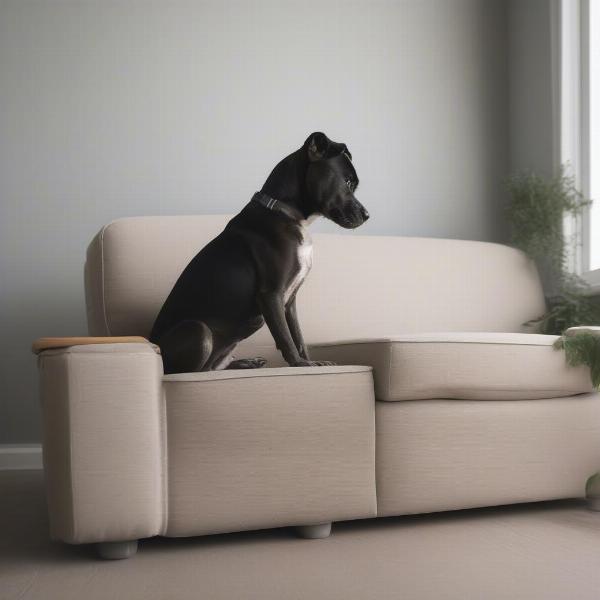Dealing with a dog that repeatedly pees on the couch can be frustrating. This article will explore the common reasons behind this behavior and provide practical, actionable steps you can take to address the issue and keep your couch clean. We’ll cover everything from identifying medical causes to implementing effective training techniques. Whether you’re a new dog owner or have years of experience, this guide will offer valuable insights to help you tackle this common problem.
Understanding Why Your Dog Pees on the Couch
Before you can effectively stop your dog from peeing on the couch, you need to understand why they’re doing it. This behavior isn’t usually out of spite, but rather a symptom of an underlying issue. These can range from medical problems to anxiety, and even simple marking behavior.
Medical Reasons for Inappropriate Urination
Sometimes, your dog’s inappropriate urination can be a sign of a medical condition. Urinary tract infections, bladder stones, diabetes, and kidney disease can all cause increased urination and difficulty controlling it. If you suspect a medical issue, consult your veterinarian immediately. They can diagnose the problem and recommend appropriate treatment.
Behavioral Reasons for Couch Peeing
If your dog is medically clear, the cause is likely behavioral. This could be due to:
- Anxiety: Changes in routine, new people in the house, or loud noises can trigger anxiety, leading to accidents.
- Submissive or Excitement Urination: Some dogs urinate when they feel overwhelmed by excitement or submissive in the presence of others.
- Incomplete House Training: Puppies and recently adopted dogs may not be fully house-trained and might simply not understand that the couch is off-limits.
- Marking Territory: Especially in multi-pet households, dogs may urinate on furniture to mark their territory.
- Preference for Soft Surfaces: Some dogs simply prefer the feel of a soft surface like a couch over a hard floor.
 Dog Peeing on Couch: Medical Reasons
Dog Peeing on Couch: Medical Reasons
Effective Strategies to Stop Couch Peeing
Now that we understand the potential causes, let’s discuss effective strategies to address the problem.
Consult Your Veterinarian
First and foremost, rule out any underlying medical conditions. Your veterinarian can perform necessary tests and provide guidance on the next steps.
Thorough Cleaning
Enzyme cleaners are crucial for eliminating the odor of urine completely. Regular cleaners may mask the scent for humans, but dogs can still smell it and will be drawn back to the same spot.
Retraining and Positive Reinforcement
If house-training is incomplete, return to the basics. Take your dog out frequently, especially after waking up and after meals. Reward successful outdoor potty breaks with praise and treats.
Managing Anxiety
Identify and address any potential stressors in your dog’s environment. Create a safe, comfortable space for your dog to retreat to when they feel anxious. Consider using calming aids like pheromone diffusers or anxiety vests, after consulting with your vet.
Discouraging Access to the Couch
When you’re not home to supervise, block access to the couch with furniture blockers, baby gates, or by covering it with a waterproof cover.
Behavioral Modification Techniques
Consult a certified dog trainer or behaviorist for personalized guidance. They can help identify the specific triggers for your dog’s behavior and develop a tailored training plan.
Dealing with Repeat Offenses
If your dog continues to pee on the couch despite your efforts, don’t give up. Consistency and patience are key. Keep a close eye on your dog’s behavior for any patterns or triggers. Consider keeping a detailed log of accidents, including the time, location, and any preceding events. This information can be helpful for your veterinarian or dog trainer.
Conclusion
Stopping a dog from peeing on the couch requires patience, understanding, and a multi-faceted approach. By addressing the underlying cause, implementing consistent training techniques, and managing your dog’s environment, you can effectively resolve this frustrating issue and enjoy a clean, urine-free couch. Remember, ruling out any medical conditions is the first crucial step. With persistence and the right strategies, you can help your dog develop good potty habits and reclaim your furniture.
FAQ
- Why does my older dog suddenly start peeing on the couch? Sudden changes in behavior can indicate medical issues. Consult your veterinarian.
- What’s the best way to clean dog urine from a couch? Use an enzyme cleaner specifically designed for pet stains.
- Can I use punishment to stop my dog from peeing on the couch? Punishment is rarely effective and can worsen anxiety. Focus on positive reinforcement instead.
- How long does it take to stop a dog from peeing on the couch? The timeline varies depending on the underlying cause and the dog’s individual response to training.
- My dog only pees on the couch when I’m not home. What should I do? Restrict access to the couch when unsupervised.
- Is it normal for a puppy to pee on the couch? Accidents are common during house-training. Consistency and patience are key.
- My dog pees on the couch when we have visitors. Why? This could be due to excitement or submissive urination. Manage interactions and create a calm environment.
dog keeps peeing on couch
why would my dog pee on the couch
how to keep dogs from peeing on furniture
why does my dog pee on couch
ILM Dog is your trusted resource for all things dog-related. We offer expert advice on dog breeds, health, training, nutrition, grooming, and much more. Our comprehensive guides and articles are designed to empower dog owners worldwide with the knowledge they need to provide the best possible care for their canine companions. Contact us today for personalized guidance on your dog’s health and wellbeing. Email: [email protected], Phone: +44 20-3965-8624 or visit ILM Dog for more information.